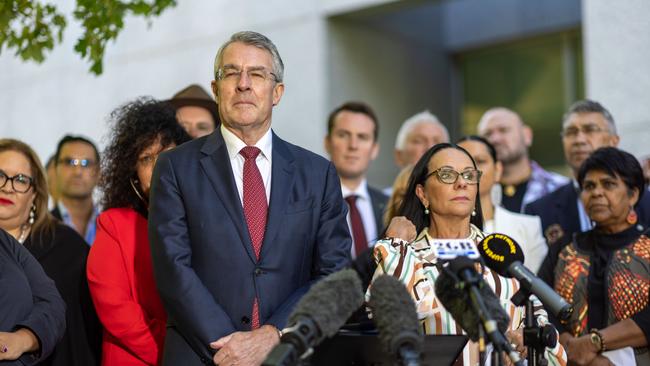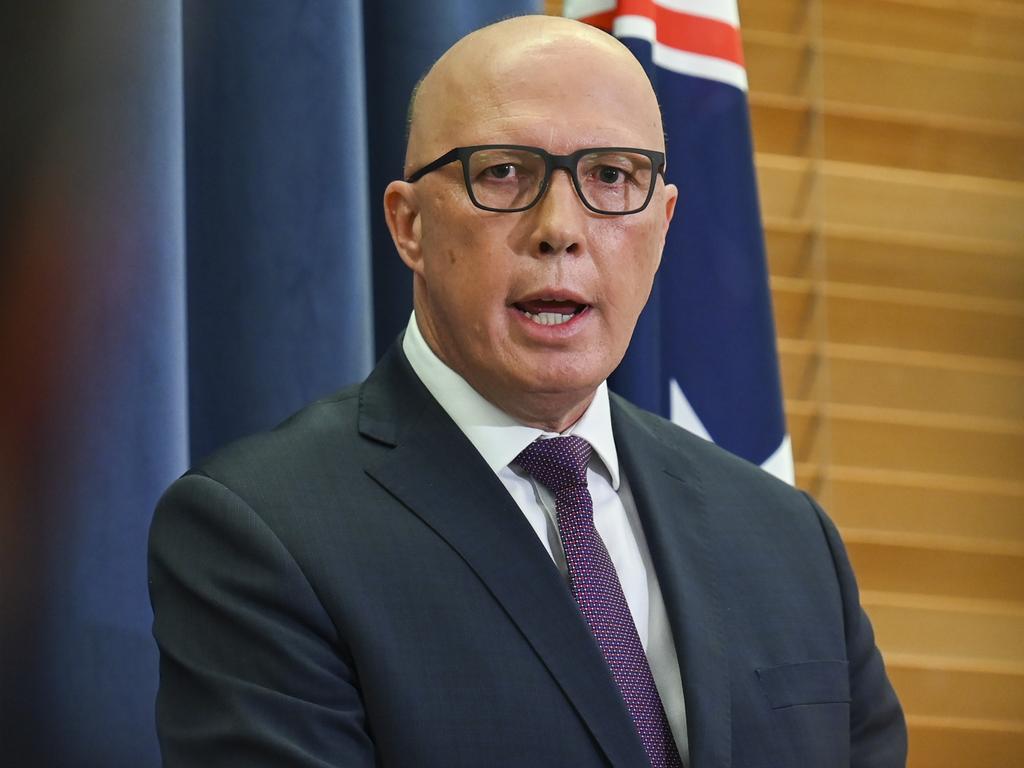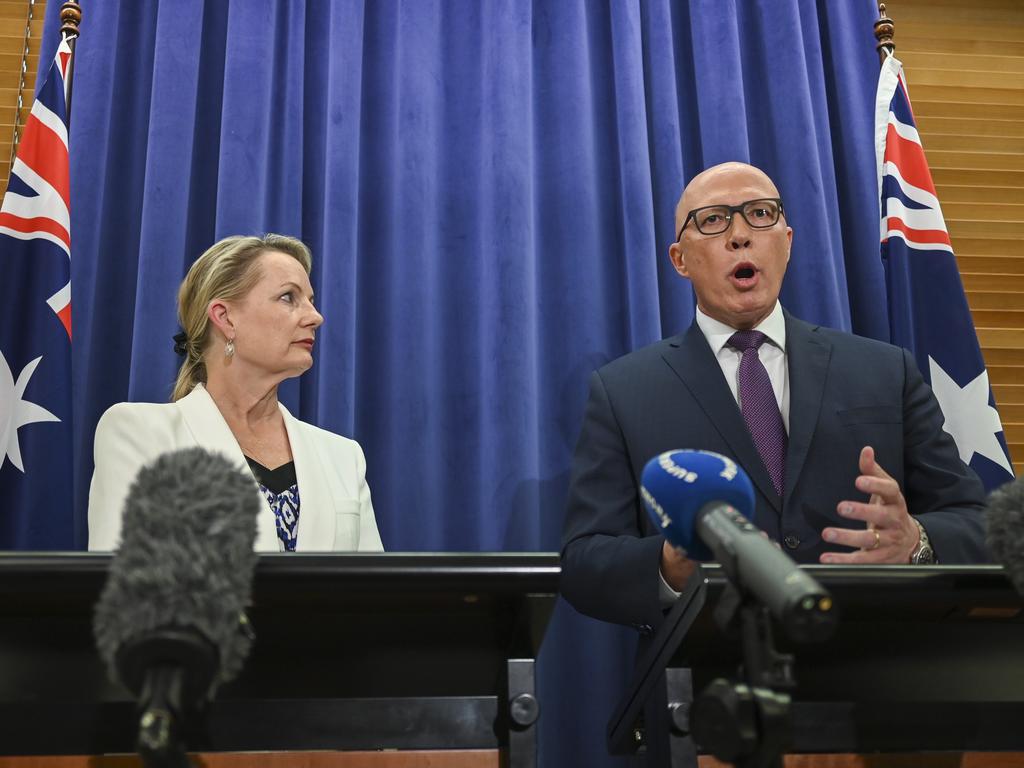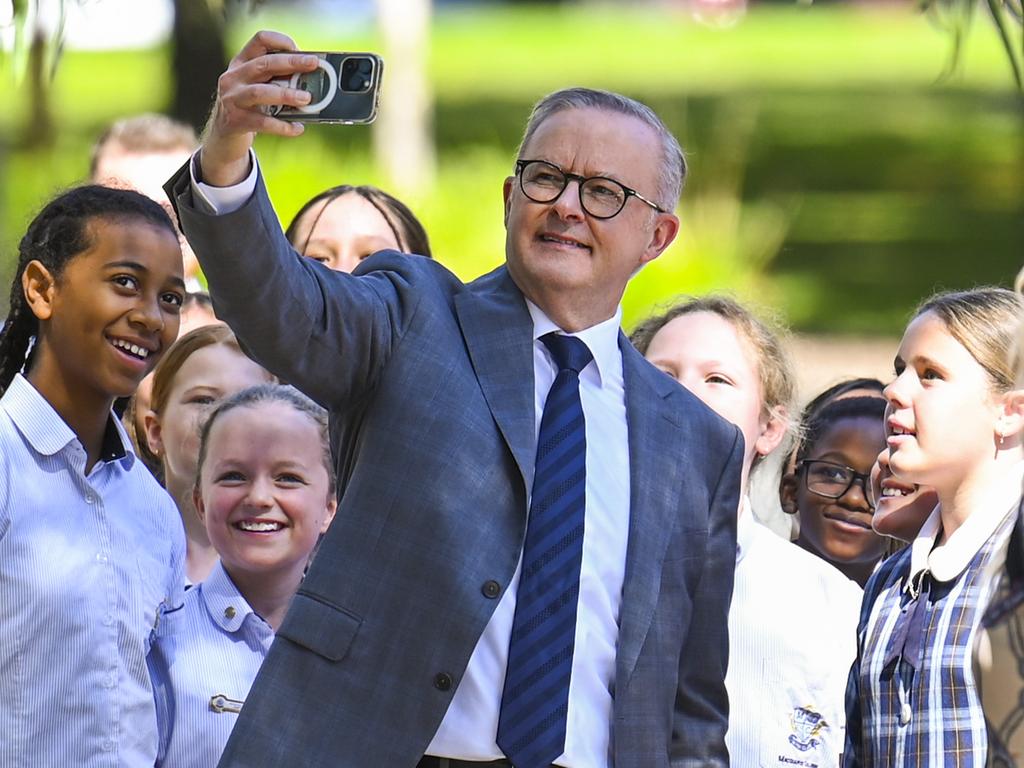Indigenous voice to parliament will create co-government and cause policy chaos
Dear voters, please read this letter to appreciate what ‘Yes’ will mean.

The day the voice is constituted, its lawyers will likely advise it to send a letter such as the one set out on this page, or take action to the same effect to establish joint sovereignty structures. I have been working with three of the nation’s most prominent constitutional and administrative lawyers to draft a letter the voice could send on day one to demand the rights that are given to it by the Constitution.
The Prime Minister plainly misunderstands the legal impact of his proposed wording, although it would seem the Solicitor-General does not. Anthony Albanese misled parliament – and the people – when he said parliament would retain primacy over how the voice operated and what it considered.
He was immediately rebuked by professors George Williams and Anne Twomey, who said parliament would not be the final arbiter of the voice’s reach. Indeed, Williams said: “That’s the point of putting things in the Constitution, it puts them beyond the parliament.”
Even more powerfully, last weekend in these pages, voice advocates professors Megan Davis and Gabrielle Appleby told the PM the “question of when the voice will speak and to whom” was not for parliament but for the voice itself. Parliament, they said, “can’t shut the voice up”.
The true purpose of the amendment is to transfer power from parliament and government to the courts, allowing the voice to hogtie (to borrow Greg Craven’s colourful but accurate word) parliament and the executive government.

The power of the voice to delay executive action by use of its rights to be heard and to litigate will mean every executive body of government must negotiate with the voice on everything it plans to do, in advance, if it is caught in the wide net of any “matters relating to Aboriginal and Torres Strait Islander peoples”. This creates co-sovereignty between our organs of government on the one hand, and the voice on the other.
This is not my assertion. This is the explicit aim of the Uluru Statement. Read the work of legal academics who have masterminded this theory of split sovereignty. An academic paper earlier this year by Professor Appleby and her colleagues Ron Levy and Helen Whalan laid out the blueprint for all to see.
The academics describe the belief of non-Indigenous people that “the Australian state’s sovereignty is ultimate and exclusive” as a mere “assumption”. They claim that Australia suffers from a crisis of “constitutional legitimacy”.
This would likely surprise the vast majority of Australians.
BEST OF VOICE OPINION: All our commentators weigh in on the Indigenous voice to parliament
While the authors may find “disagreement with the authority of our constitutional order”, the accepted position on sovereignty was laid out by then chief justice Anthony Mason in Coe v Commonwealth (No 2) in 1993. Mason said the High Court in the Mabo decision clearly rejected “the notion that there resides in the Aboriginal people a limited kind of sovereignty embraced in the notion that they are a ‘domestic dependent nation’ entitled to self-government”.
Too little attention has been focused on the fact the Uluru Statement explicitly rejects the sole sovereignty of the Australian Crown. Moreover, there is a vast and flourishing industry of legal academics represented by Appleby and co, but also many others in our law schools, and applauded by the legal profession, which seeks, or at least waves through, this radical change. The change desired, to borrow from Appleby’s blueprint, is constitutional change which “may allow the voice, working with parliament, to be an alternative site for decision-making about how settler and First Nations communities can manage their shared (or conflicting) resources, institutions and spaces in ways that accommodate each community to the other”. The aim here is clearly not parliamentary primacy, Prime Minister, but rather shared power.
Including the power to make representations to “executive government” in the proposed constitutional amendment is critical to this co-sovereignty. Those few words brings with them an enormous body of public administrative law governing the way courts will be able to interpret the voice’s powers, offering the voice power to delay government decisions. This body of law will be used by the High Court, cannot be ousted by parliament and will give the voice rights of procedural fairness.
These rights include, but are by no means limited to, the right to be given advance notice of matters within the voice’s remit; the right to be given sufficient time and resources to consider the matter; and proper consideration of any representation it makes.
The voice will, if properly advised, demand all these rights on the first day it is constituted.
The letter in the accompanying box is but one example. The voice will have many other ways to enforce its rights if it chooses. The methodology could vary but the result will be the same: a radically different form of government for the country, where, across large swathes of executive government, there is co-government.
-
A letter the voice could write to bureaucrats
Dear (insert name of head of relevant department/agency/government business enterprise),
As you know, the Aboriginal and Torres Strait Islander voice has been given a constitutional right by the Australian people to make representations on matters relating to Aboriginal and Torres Strait Islander people.
That right is not limited to making representations about matters that have a direct or special or substantial or different effect on ATSI people. The voice has a constitutional right to make representations about any matters that may relate even indirectly to ATSI people and about matters that affect all Australians.
The voice hereby advises that we will make representations to you on the following matters, at least: (insert matters relevant to the bureaucrat/department/agency/, for example, in the letter to Treasury, APRA or the RBA this will include any change in interest rate policy, bank lending and consumer credit policy or policies concerning regulation of financial services entities.
In the letter to the Dept of the Environment, it will cover every proposal for development of any mineral, mining or hydrocarbon project, or any dam or other infrastructure. In the letter to the Department of Health it will include every proposal to build, replace or renew any health facility, every proposal for expenditure on health policy, and every alteration of health policy).
For the voice’s constitutional right to make representations to have practical effect, the voice must be given advance notice by your (department/agency/body) of any proposed decision, evaluation, assessment, expenditure, policy change, or any other matter that may relate to ATSI people.
Advance notice of decisions is essential so that the voice has the opportunity to obtain information about the matter and then make a representation if appropriate. This view is reflected in the voice design principles released by the government, which provide (among other things) that:
• The voice will be able to make representations proactively.
• The voice will have its own resources to allow it to research, develop and make representations.
• The parliament and executive government should seek representations in writing from the voice early in the development of proposed laws and policies.
Accordingly, in addition to the specific matters listed above, the voice hereby requires you to give us advance notice of any proposed decision, evaluation, assessment, expenditure, policy change, or any other matter that may relate to ATSI people.
Given that the voice’s constitutional right to make representations is not limited by reference to the size or importance of a matter relating to ATSI people, you must not censor or filter matters upon which we may wish to make a representation. While we may not wish to pursue minor or trivial matters, we wish to make that judgment, not have you make it for us.
In order to give the voice adequate time to consider such matters and formulate any representations, we require you to give us notice of all relevant matters as soon as such matter arises and, in any event, at least 90 days before the decision, evaluation, assessment, expenditure, policy change, or other matter is made.
You must provide all documents, and access to all your personnel, which the voice considers appropriate to enable it to effectively make representations … this means that any material that is before a decision maker, or during the development of a policy must be made available to the voice if the voice requests it.
We put you on notice that you must not implement any such matters unless the voice has been given the time to make proper representations and discuss them with you.
The voice is in the process of hiring qualified professionals to enable it to exercise properly our right to make representations in every area of government which affects ATSI people. In the interim we will have (insert number) voice officers dedicated to monitoring matters that arise in your (department/agency/body), and we propose at least (number) will be permanently embedded in your offices to enable the voice to work effectively.
We envisage that in the fullness of time there will be a voice agency within your (department/agency/body) so that effective oversight of your policy development, policies and decision making can be carried out by the voice on a continuous and ongoing basis.
Please note that failure to comply with the requirements contained in this letter or to give proper consideration to any representations made by the voice may render any action taken by you liable to challenge by the voice in the courts, with the real risk that any decision taken will be rendered invalid until we have been given time to exercise our constitutional right to make representations.
Where we deem necessary, we will not hesitate to prosecute the constitutional guarantee which has been afforded to us by the Australian people, including seeking injunctive relief to prevent the making of a decision which affects ATSI people, to ensure that our right to make representations has been provided in a way that is both substantive and practical.
Moreover, you will be aware that s 75(v) of the Constitution provides an irremovable right to judicial review of any unlawful decision made by an officer of the commonwealth affecting that person’s interests. Please be aware that the voice takes the view that s75(v) protects it, or any other persons affected by any final decisions made by an officer of the commonwealth relating to ATSI people.
Please be advised that if your department makes a final decision which affects ATSI people and during the process of making that decision fails to give due consideration, does not provide the voice procedural fairness, or considers the representations in an unreasonable way (in other words, if you do anything which provides the basis for a constitutional writ under s 75(v) of the Constitution) we will not hesitate to commence action in the Federal Court of Australia to invalidate that decision.
We are in the process of establishing a Voice Legal Affairs unit which will be equipped to provide legal advice to staff in your (department/agency/body) so that they may better understand their legal obligations and the broader administrative law implications of our constitutional right to make representations. We will advise you when the VLA is established and look forward to working with your (department/agency/body) so that the representations of the voice are received in a way that conforms with the Constitution.
In the meantime, we suggest that your staff undergo legal training concerning the obligations on them to take due consideration of any representations by the voice which are constitutionally mandated for consideration.
Your sincerely,
(insert name)
CEO, The Voice,
Canberra








The declared aim of the Yes advocates who have led the drafting of the proposal to place the Aboriginal and Torres Strait Islander voice in the Constitution is co-government. Co-government is also what the words of the proposed amendment will achieve.